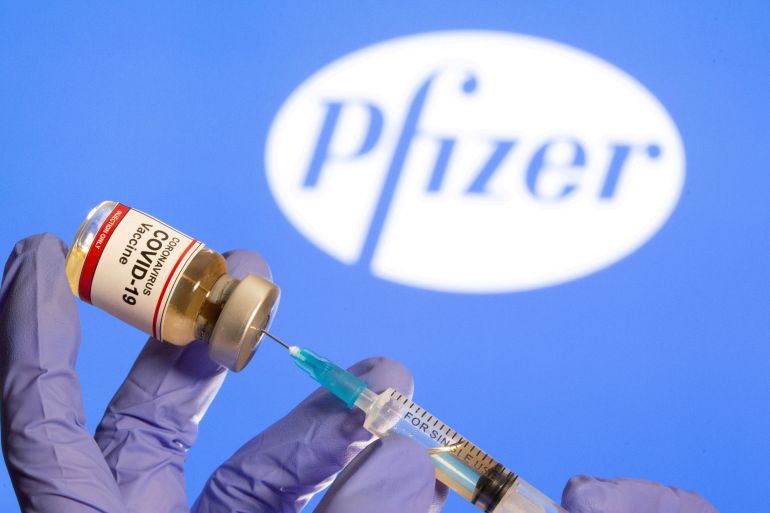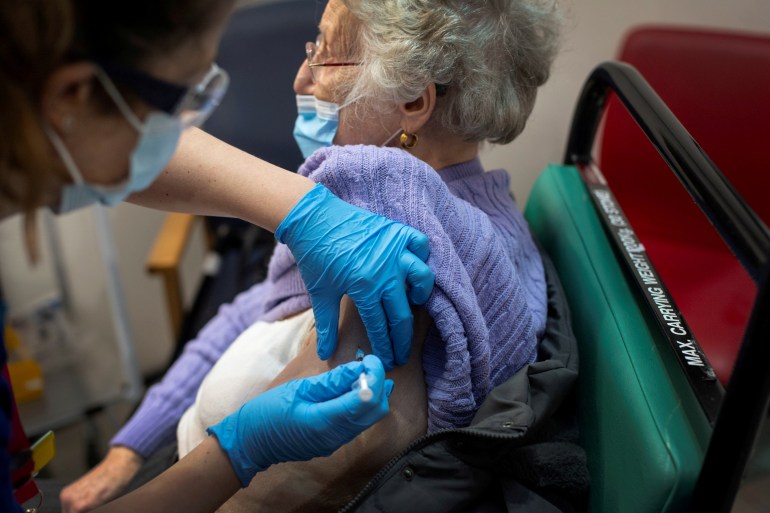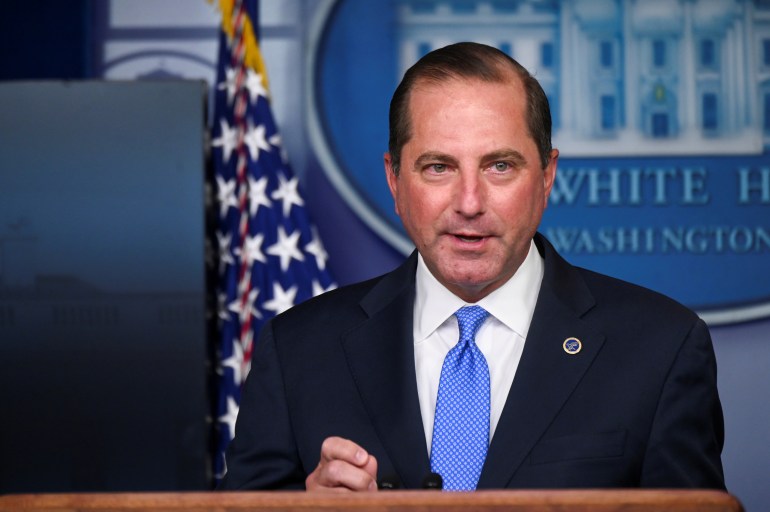US issues emergency authorisation of Pfizer-BioNTech vaccine
Officials hope the vaccine will get COVID-19 pandemic under control as cases surge and as the death toll nears 300,000.

The United States Food and Drug Administration (FDA) issued an emergency authorisation to use the Pfizer-BioNTech COVID-19 vaccine on Friday, paving the way for the first Americans to be immunised in the coming days.
“I am authorising the emergency use of Pfizer-BioNTech COVID‑19 Vaccine for the prevention of COVID-19,” Denise Hinton, the agency’s chief scientist wrote in a letter to a Pfizer executive.
Keep reading
list of 3 itemsAstraZeneca to trial combination with Russian COVID-19 vaccine
US to buy 100m more doses of Moderna COVID-19 vaccine
The decision follows a regulatory process that involved a panel of independent advisors weighing in on the safety of a two-dose vaccine that the drugmaker had asked to be approved for use in people aged 16 and older.
Officials and medical experts hope the vaccine will help get the pandemic under control after more than 292,000 Americans have been killed to date – more than any other country in the world. More than 15.8 million have been infected.

In a televised statement posted on social media, US President Donald Trump hailed the development as a “medical miracle”, adding that the first vaccine will be administered in the next 24 hours.
“This is one of the greatest scientific accomplishments in history,” he said.
“It will save millions of lives and end the pandemic once and for all.”
More than 2,700 people died in the US on Thursday, according to a tally by Johns Hopkins University – a grim pace that medical officials have said is likely to continue through the coming months.
The worrying surge of COVID-19 cases around the country has filled hospitals and overstretched healthcare workers, many of whom have tested positive for the virus themselves.
In a statement issued on Friday, the FDA said it had notified the US Centers for Disease Control and Prevention (CDC) and Operation Warp Speed – the federal government’s vaccine development programme – to prepare for swift distribution of the vaccine.
Earlier on Friday, Health and Human Services Secretary Alex Azar told ABC’s Good Morning America news programme that following the FDA’s authorisation, “We could be seeing people getting vaccinated Monday, Tuesday of next week”.

On Saturday, the FDA’s Hahn said that despite the unprecedented timeline “this vaccine met the FDA’s rigorous standards for quality, safety and efficacy. Science and data guided the FDA’s decision.”
He added: “I will absolutely take this COVID-19 vaccine pending availability and distribution.”
The federal government has said it will initially distribute only 2.9 million doses following FDA authorisation, about half of the doses Pfizer will make available in the first week, US media outlets reported this week.
The other half will be reserved to guarantee that those vaccinated will be able to receive their required second dose three weeks later.
Pfizer has said that its two-dose regimen is safe and is 95 percent effective in preventing COVID-19. Data included in FDA documents showed the vaccine began protecting volunteers even after the first dose.
But there have been some safety concerns, especially after two people in the UK suffered from anaphylaxis, a severe and sometimes fatal allergic reaction to the vaccine.
Trump, who will leave office on January 20, has been pressuring the FDA to approve the vaccine faster. On Friday, he singled out FDA Commissioner Steven Hahn, accusing him of “playing games”.
While my pushing the money drenched but heavily bureaucratic @US_FDA saved five years in the approval of NUMEROUS great new vaccines, it is still a big, old, slow turtle. Get the dam vaccines out NOW, Dr. Hahn @SteveFDA. Stop playing games and start saving lives!!!
— Donald J. Trump (@realDonaldTrump) December 11, 2020
The Washington Post reported that Trump’s chief of staff, Mark Meadows, told Hahn on Friday to authorise the vaccine by the end of the day or resign.
Hahn disputed that report, calling the firing threat “an untrue representation of the phone call with the Chief of Staff”. He later said there was no “external pressure” put upon him.
US front-line workers, such as doctors and nurses, are expected to receive the first doses, as well as vulnerable groups such as elderly residents in nursing homes.
But it will ultimately fall on local authorities to decide how the vaccine will be administered and whom to prioritise. So far, states and local governments have devised their own plans of what is expected to be a monumental task.
To stop the virus from spreading, at least 70 percent of the population would need to be inoculated, a goal which will probably not happen before March, when Pfizer and other vaccine candidates are expected to produce enough doses.